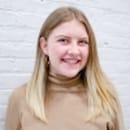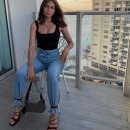ICYMI, the podcast industry is booming. Like, really booming. Crime Junkie is the definition of turning your passion into a career— as an avid true crime fan who literally couldn’t get enough of the true crime products out there, podcast creator and co-host Ashley Flowers filled a void of content that she was craving. Every Monday, Ashley and her co-host Brit Prawat release a new episode of Crime Junkie, covering a new true crime story in the same way you and your BFF talk about crime and conspiracies.
We chatted with Ashley Flowers to hear all about the surreal moment of hitting #1 on the Apple Podcasts chart, the hustle of turning your creative passion into a business, and the advice she has for jumping into the podcast industry.
Her Campus (HC): How did you get interested in the podcast industry?
Ashley Flowers (AF): I never grew up wanting to be a podcaster — I mean, nobody knew what podcasting was — but it started in 2014, when I found Serial. Serial is what introduced me to the world of podcasting. After Serial, I tried to find any true-crime podcast — I went through every single one and there still wasn’t enough content for me. Even more than that, there was a show that I really, really wanted to listen to, and I just couldn’t find it. So, I kept looking for this specific show that I couldn’t find.
While all of that was going on, I was working full-time and I wanted to volunteer, so back in 2012, I got involved with Crime Stoppers of Central Indiana. I was their volunteer coordinator to start, and eventually, they put me on their board of directors. It was really my mission to get younger people interested in the program or even just aware of what it was. No one my age knew what Crime Stoppers was. After working with them for a year, I had been telling everyone, “I want to do a podcast.” I reached out to a local radio station and partnered with them in Indianapolis, doing a short little segment every Monday morning. I talked about true crime and in exchange, they would advertise for Crime Stoppers. It took off and became their number one segment. They became the number two station in the city, and it was really cool. That’s when it occurred to me — because at this point I had never thought about having my own podcast — that maybe, I could tell stories, and maybe I could make the show that I haven’t been able to find so far.

After doing the radio show for about six months, I started Crime Junkie in December of 2017. I wanted to make more true crime content and make the show that I really wanted to hear. My background wasn’t media-related at all. I went to Arizona State University and graduated with a degree in biomedical sciences. All through college, I worked full time at a hospital and really thought the medical track was what I was going to do. After graduation, I actually moved back to my home state of Indiana because I got a job doing genetics research at the University of Notre Dame. I left there to work for a startup company in medical sales and from there, a small company in software sales. I had done a bunch of different things, which I think is more of a millennial thing to do until you find the thing that you love. I tell people all the time that I credit it to why the podcast was successful. I got to learn so many different things, especially working at a startup company; I got to really understand how a business was run. When I went to launch my podcast, that was the number one thing I did differently than a lot of people. I tell that to every person who is very serious about starting a podcast. From day one, I treated it not as a hobby or this cute creative thing, but like a startup business. I had my LLC before I even released an episode, and I had a business and marketing plan. You can make a podcast for free — anyone can do it. But this was going to be my full-time job. I was making a creative business and put almost half of my entire life savings to starting it, not knowing if I would ever see a dime back.
HC: What were the biggest lessons you learned along the way in starting your own podcast and podcast network?
AF: I think there are a few answers to that. I learned that Google is my best friend. When I came in, there was no guidebook for how to podcast or how to market a podcast. There were only a handful of people I could look to that were independent podcasters who were doing it successfully as a living. Anyone can do it, but I get a lot of emails from people that just say, “Well, where do I start?” There was no one there to tell me where to start — you just have to have that go-get-’em attitude on your own, because even now, I don’t think there’s a formula or a playbook. Luckily, this goes back to me working at startup companies. I had to pave my own path and figure out what was going to work. If you’re looking to get into an industry where you put in X amount of dollars and do X plan, that’s not what this industry is. It’s exciting for people to go into this unchartered territory, and I think podcasting is kind of like the wild west of media right now. If people are excited about that, then I think they’ll be very successful.
Even treating the podcast as a business, though, was tough for me. I had never run a business before, so even though I had all the plans, watched other people do it, and had a good idea of what needed to be done, I didn’t know how to keep my own books. I didn’t know how to create a full marketing plan and execute on that. It’s so surprising to people when they look at our podcast, which seems effortless, that it takes a lot of work to make it look that effortless. I think 70% of what I do all day is run a business, and 30% of what I do is actually create content and actually putting out the podcast.
I think knowing when to bring people on or look to experts is also super important. I think people get stuck in one field of study. Get more general — which isn’t a message people put out a lot — but if you’re a super creative person, take some business classes. If you’re wanting your creativity to be your full-time job — especially if you want to work for yourself — you have to know how a business runs. As creative as you want to be, you have to learn the boring business stuff. It’s so essential.

HC: Crime Junkie has obviously seen so much success, being #1 on Apple’s Podcast chart. What has been the most surreal moment of your career thus far?
AF: There have been two. One was when I was at PodX just a couple of months ago. I was on a panel with a couple of other podcasters and I was sitting next to Susan Simpson and Rabia Chaudry from the Undisclosed podcast, who have just been doing insane and wonderful work. To be on the same stage as them, or even considered a peer to them, was just mind-blowing. To be considered in the same realm as two women who I had been listening to for years, and looking up to, this was just bizarre to me. I’m from Indiana, and I made the podcast out of my spare room.
When the podcast went number one on iTunes, I was just blown away. Again, I was underestimating what I was capable of. That was never a goal I set for myself because I thought it was too far fetched. I thought that was reserved for big businesses or the podcast networks of the world. To hit that, knowing that I hadn’t signed with anyone, that I was running my own business, that I did that on my own, was probably the best feeling I ever had.
HC: What kind of advice would you give to a 20-something college woman who has aspirations of either breaking into the podcast industry, working within it in media or starting her own hustle of her creative passion?
AF: If you want it to be more than a hobby, treat it as more than a hobby. You’re going to have to give up a lot. This last year of my life has been totally different — I don’t see my friends and my husband as much and I had to figure out how to work together now. It’s truly a dream, but you have to give some stuff up for a while and work hard at it. More importantly, if people are creating a show — beyond the business, beyond the marketing and all of that — you still have to have great content. I could’ve had the best business plan in the world and put all of my money into marketing, but if someone listened to the show once and never wanted to come back, I just wasted a lot of money. What I see a lot of people do is they find a show that they like or a genre that they like and they create another version of something that’s already out there. It’ll never work that way. What I keep telling people is before you even think about the business, think about a show that fits some kind of niche. What hole are you filling for listeners? Know who your listener is. I think my show has been successful because every decision I’ve made about my listener, I make myself, because I was the person who I was creating the show for. If you can get in the mindset of your listener, it will do tremendously.



